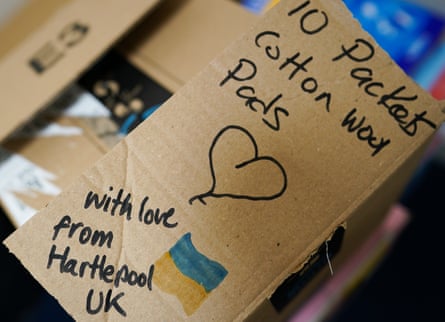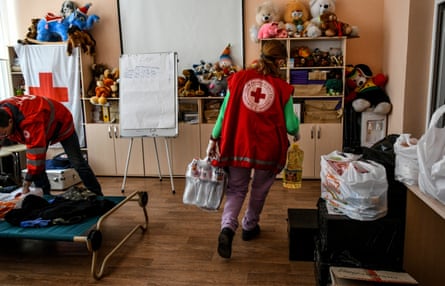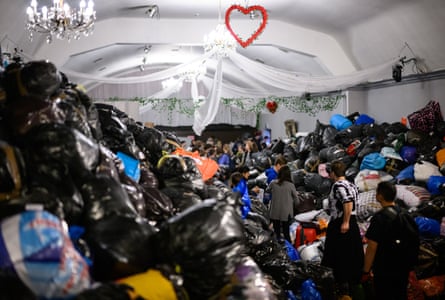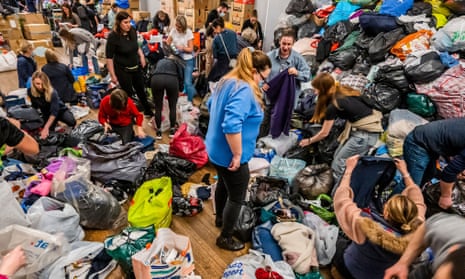As the conflict in Ukraine unfolds on your television screen, you may be wondering what you can do to help those caught up in it. Here’s a guide to how you can make a difference.
Donating money
Earlier this week, the Disasters Emergency Committee (DEC) launched a Ukraine Humanitarian Appeal to raise funds for food, water, medicine, protection and trauma care for people fleeing the war. At times of crisis, the DEC brings together 15 leading UK aid charities (including the British Red Cross, Cafod, Care International and Save the Children UK) to raise funds quickly and efficiently.
This is one of the best appeals to give to because if you donate via the main DEC Ukraine appeal every pound given by the UK public to the DEC is matched by the government, up to the value of £20m. You can donate at a Post Office, as well as directly.
Other charities have also launched appeals and continue to need public support. Here’s a roundup of what some of the other big aid charities are doing.
The UN Refugee Agency estimates that about 660,000 refugees have fled Ukraine to neighbouring countries. In Poland, it is providing new arrivals with information and legal services through a local legal partner.

In Romania, it is providing advice on asylum procedures and is offering legal advice and psychological support through partners.
At the border with Moldova, it is distributing essential relief items, including blankets, sleeping bags and hygiene items, and it is also working at the Slovakian and Hungarian borders.
Where possible, it is liaising with community leaders in Ukraine to assess their humanitarian needs and also delivering essential aid to internally displaced people. You can donate online.
The British Red Cross has its own appeal as well as being part of DEC. Alongside supporting people in Ukraine, donations will help its teams on the Polish, Slovakian, Romanian, Hungarian, Moldovan and Lithuanian borders to provide accommodation, food, water and other aid items to refugees. You can donate online by card or PayPal, as well as via the DEC appeal.
The charity Care International is providing emergency relief through its partner, People in Need, which is already working on the ground in the region. Over the past week, this non-governmental, non-profit organisation has been sending trucks of durable food, hygiene items, nappies, sleeping bags, mats, and other goods into Lviv in western Ukraine to distribute to people locally.
On the Slovakian border, PIN is supplying mobile toilets, building insulated tents for children and preparing food for people in the queues.
Save the Children is distributing essential supplies and winter kits of clothing and blankets, providing cash and financial assistance to families to meet basic needs such as food and medicines, and offering mental health support to children and their families. It suggests that a donation of £12 could help a victim of the violence access legal help or safe shelter.
The International Committee of the Red Cross is working closely with the Ukrainian Red Cross Society to provide emergency assistance and support local hospitals and primary healthcare facilities with medical equipment.

The URCS is also supporting local firefighters, medical and civil protection units and helping to repair vital infrastructure. Its volunteers are providing first aid training to 1,000 people in metro stations and bomb shelters. You can donate online.
Unicef has staff in the country in several locations and is helping to provide families with access to clean water and food, as well as psychosocial support for traumatised children, recreation kits and learning kits. “Needs are wide, ranging from hygiene products to blankets, gas burners and first aid kits,” Afshan Khan, the Unicef regional director for Europe and central Asia, says. In recent days, the charity said heavy weapons fire along the contact line in eastern Ukraine had damaged water infrastructure and schools.
It estimates there are up to 7.5 million children in need of support and says a £46 donation will provide a family with an emergency water and hygiene kit. Donations can be made online or over the phone: 0300 330 5699.
Teams from the charity Médecins Sans Frontières are responding to medical and humanitarian needs as the conflict evolves. It has been providing training in emergency medicine and surgical preparedness to hospitals, as well as mass casualty kits with supplies for treating traumatic injuries.
The charity is preparing more medical kits for rapid dispatch and has also sent additional emergency teams to the region, enabling it to assess the needs of Ukrainian refugees in Poland and neighbouring countries. You can donate online.
Cafod, the official aid agency for the Catholic church in England and Wales, is sending funds to Ukraine through the Caritas Internationalis aid network, which is running warm and safe “collective centres” that provide beds, food, washing facilities and safe spaces for children. Donate online.
World Jewish Relief has started transferring emergency funds to its 29 local partners in Ukraine. “We are prioritising food, cash, medical, material and psychological support for the worst affected,” a spokesperson says. In neighbouring countries, such as Moldova and Poland, the charity is supporting refugees with food, water, personal protective equipment and accommodation. You can donate online.
The World Health Organization is raising funds for its frontline response and to deliver life-saving medicines and supplies to people across Ukraine and to refugees.
Donating supplies
Across the UK, local communities are collecting items to deliver to Ukrainian refugees.
Items typically sought include blankets, pillows, sleeping bags, bed linen, tents, warm and thermal clothing, first aid kits, bandages, painkillers, nappies, toiletries, torches with batteries, toothbrushes, toothpaste and toys.
Local newspapers are reporting on drop-off points, so it is usually possible to find out where collections are taking place with a quick online search.
Do check that items are still being collected before you attempt to donate anything as some drop-offs are now full and don’t have capacity to transport anything else across Europe.
The White Eagle Club, a Polish social club in Balham, south London, has become a hub for donations in the capital. Last Monday, the first truck full of donations left for Poland, packed by volunteers.
This week, as word about the club’s efforts spread on social media and Polish radio, donations have snowballed and vanloads of items are coming from across the UK. “So many places have called us and said I’m going to collect donations, get a van and bring it down to you,” says Krzysztof Gondek, the manager of the club.
After requesting help with delivering these items from transportation companies, the club has managed to secure at least 30 more trucks to take these donated goods to Poland.

Transporting donations across a post-Brexit Europe is a time-consuming process, the volunteers say, and they cannot take donations of food or liquid as a result. To ensure the donated items do not attract EU customs duties, the club is donating them all to the Polish arm of the charity Caritas, which is then going to distribute the items to the refugees arriving on the border.
If you cannot find any local collections to donate to, an alternative option is to buy “survival items” from the online aid shop of the charity RefugEase. It sells food parcels, hygiene packs and medical packs.
“The money you spend on buying items from our aid shop is ringfenced,” Valentina Osborn, the managing director of the charity, says. Each item is bought from a local retailer and delivered to a storeroom of the charity in Hungary. “These items are then driven to the Ukrainian border. In our opinion, it’s the most transparent and efficient method of donating towards a humanitarian crisis such as this,” she says.
Supporting people directly
The online marketplace Etsy recently cancelled listing fees, transaction fees and advertising fees for its Ukraine-based sellers.
Buying a digital file from a Ukrainian seller, such as a poster or an embroidery pattern, means they receive the money but do not have to post an item to you from the middle of a war zone.
It is possible to look exclusively for items for sale from Ukrainian sellers on Etsy but it does require a bit of effort. You need to search using a keyword, then filter your search settings and choose “custom”, and then type Ukraine as the shop location.
There are many other products for sale on Etsy that show solidarity with the Ukrainians or display the colours of the Ukrainian flag. Do not assume, however, that all these items are being sold by sellers from the country.
Earlier this week, a Guardian reader, Jen Rouse, tried to use the site to buy a digital file from a Ukrainian seller to support them. She was alarmed to find many sellers – who were not Ukrainian – listing “Stand with Ukraine” branded items, without donating any money from the proceeds to the Ukrainian cause. “I think a lot of people will be buying these items to support Ukraine when they’re actually lining individual people’s pockets,” Rouse says. “It doesn’t feel right to me.”
Donating with Gift Aid
If you are a UK taxpayer, donating through Gift Aid means charities can claim an extra 25p for every £1 you give.
The other good news is, if you are a higher-rate taxpayer, you can claim the difference between the rate you pay and the basic rate on your donation through your self-assessment tax return or by asking HMRC to amend your tax code.
For example, if you make a £10 donation to a charity, the charity can claim Gift Aid, pushing your donation up to £12.50. If you are a higher-rate taxpayer, you can then claim back £2.50, effectively reducing the cost of your donation to £7.50. Make sure you keep track of your donations as you make them, so you will have the details to hand when you fill in your tax return.
There are rules you need to follow if you do want your donation to qualify for Gift Aid. First, you must pay income tax or capital gains tax to HMRC in the tax year in which you make your donation and second, you must give a declaration to each charity you want to donate to through Gift Aid, confirming that you do pay enough tax to qualify for the scheme. Finally, it is worth noting that your donations will not qualify if they are more than four times what you have paid in tax that year.
